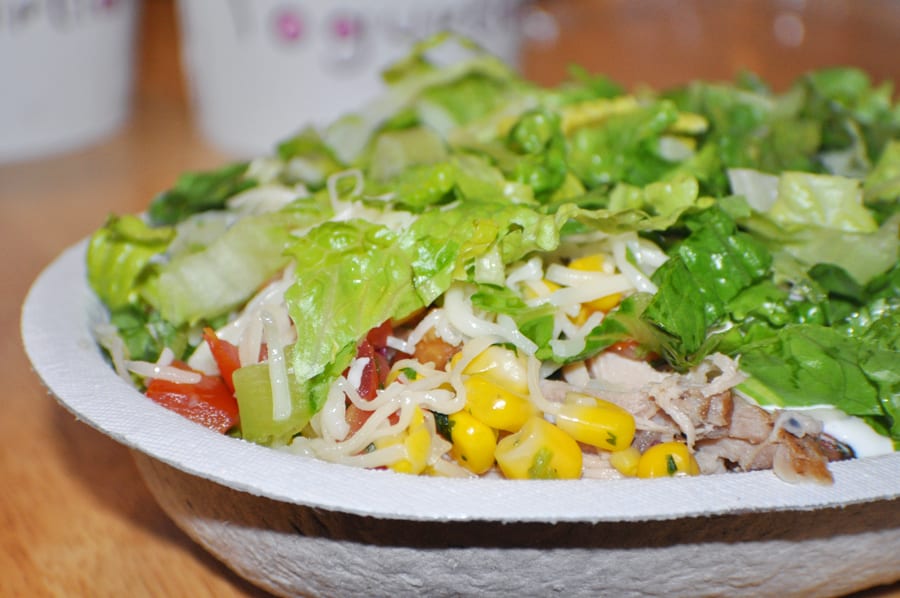Like using those wholesome, organic-looking, compostable fiber bowls? Don’t! They’re full of PFAS and that stuff never goes away.
Compressed fiber bowls were going to save the world. With increasing numbers of woke municipalities and businesses looking to ditch planet-choking plastic and ozone-depleting foam products, packaging manufactures offered up an appealing-seeming solution in the form of molded fiber bowls, plates, and clamshell take-out containers. Whole restaurant chains have sprung up to embrace the virtuous-feeling new bowls, piling them full of brown rice, wildcrafted herbs and locally-grown farm-fresh ingredients, while established restaurants (like Chipotle) turned to them to burnish their eco-friendly image. The bowls were even said to be 100% compostable. What could go wrong?
Turns out, quite a bit.
The New Food Economy, a non-profit independent news organization devoted to investigative reporting on food and sustainability issues, recently released the results of a long, hard look into the eco-viability of the popular compressed fiber bowl. What they found was less than delicious.
They tested 14 of the fiber bowls from eight different restaurants around New York City, looking for fluorine on the inside and outside surfaces. Why fluorine? Finding measurable traces of fluorine would indicate that the plant fibers that comprise the bowls had been mixed with PFAS, the same fire-retardant chemical that’s polluting waterways and military bases around the country. Manufacturers of the molded fiber bowls include the chemical to make them more durable and able to hold hot, greasy and wet foods without falling apart and dissolving on the dinner table instead of the compost pile.
All of the bowls tested came up positive for fluorine. The outside surfaces had more than the food-adjacent inside surface, but together, all of the samples averaged 1670 ppm fluorine, fifty times higher than a square of office printer paper used as a control. These results imply that the fiber bowls had been treated with PFAS.

Why is this important? After all, you’re not eating the bowl itself, and the amount of PFAS absorbed by the food inside is likely to be very small. The bowls themselves fully met FDA regulations. The problem comes in when restaurants or consumers give the fiber bowls a second life in their compost piles. Unlike the cellulose that makes up most of the bowl, PFAS is considered to be a “forever” chemical that doesn’t degrade. Every molecule of PFAS ever made by human hands will still be circulating through our environment until the Sun expands into a red giant and engulfs the Earth in about 5.4 billion years. That’s a long time for so many species, us included, to be living in an increasingly toxic stew.
Assuming that the fiber bowls really are composted, perhaps at the farms which supply those restaurants with fresh foods season after season, PFAS will build up in the soil, and eventually in the food itself. Perhaps Whole Foods, which brags about their “certified compostable” take-out packaging but doesn’t always make a point of collecting the containers anywhere but the trash, has the most eco-friendly outcome, but even landfills leach PFAS into waterways.
By now, you may be wondering if any options for eco-friendly, convenient consumption really exist at all. If possible, consider taking your own bowl and cutlery to potlucks and other events where food is served. Even if it’s plastic, a bowl you can use countless times is better than one you throw away (with or without the PFAS). Of course, buying a newly manufactured “sustainable” anything is going to be a bigger waste of resources than using the “unsustainable” one you already have. “But what about take-out?” you might ask. “After all, they don’t let you bring in your own dishes!” That’s correct, and it’s part of why our current culture is not anywhere near sustainable, nor will small, easy changes make it so. Billions of people using and throwing away billions of wasted, manufactured goods is inherently unsustainable. Condemning our descendants to live in a PFAS-infused world is the price we pay for choosing such conveniences now. Drink up!
Related: One Water Problem After Another
Sources:
Oopsie, this popular ‘compostable’ bowl actually lasts forever
Purchasing Safer Compostable Food Service Ware
Here’s why compostable bowls like the ones at Chipotle could be a public health concern
Whole Foods Ranked Worst on Cancer-Linked Package Chemicals
Mapping the Expanding PFAS Crisis
Michigan landfills are a small source for PFAS in waterways, study says
Shop less, live more – save the planet. It doesn’t sound that bad to me


Join the conversation!